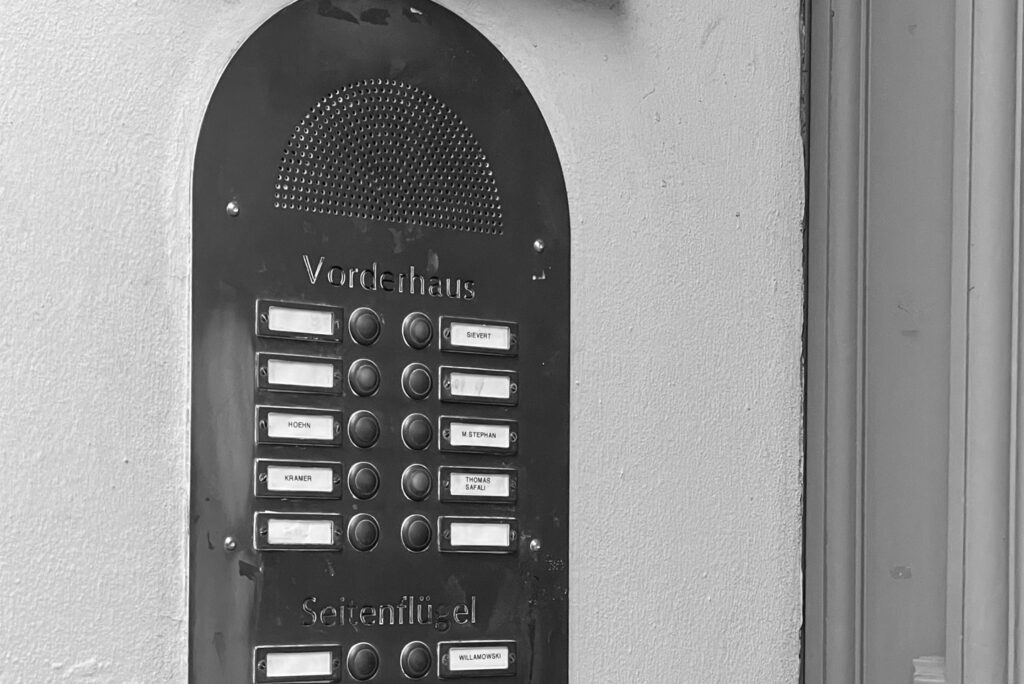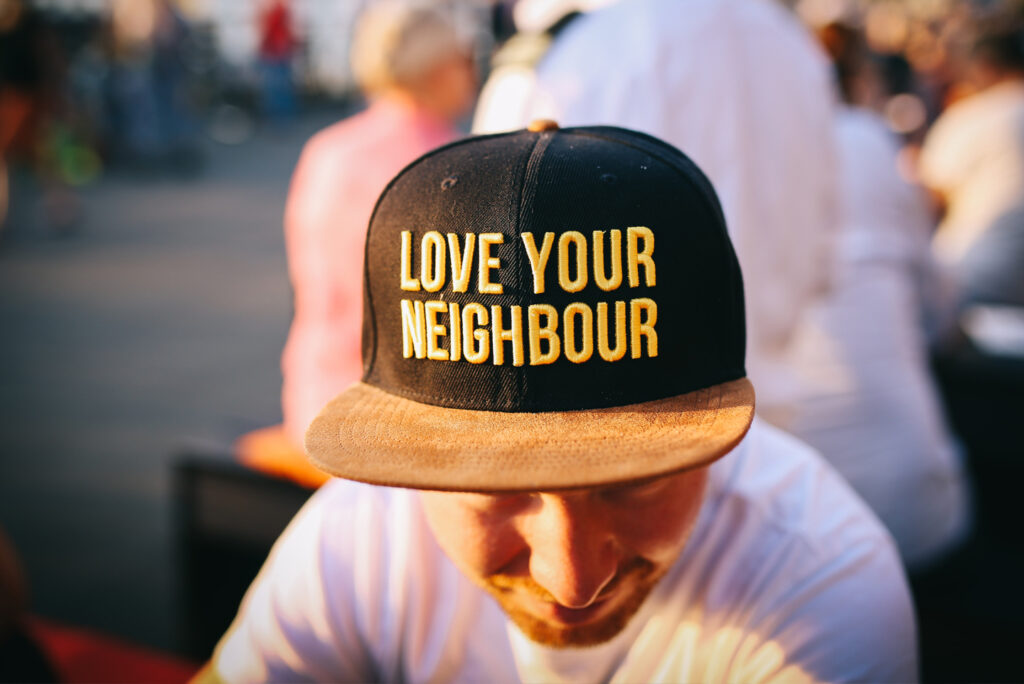Whether you’re new to the street or not, take a deep dive into your community and find out how surveillance technology and a neighbourhood app will change you into a nosey neighbour for all the right reasons.

The premise of the app Nextdoor is a cross between Facebook and a nosey neighbourhood WhatsApp group, connecting users to their local community, neighbourhood, and area all on one platform. Users are free to post anything they wish to members in their local area… within reason and this is where the fun starts.
While the CEO of Nextdoor Sarah Friar, who spoke to Belfast live, has said the app “might be (used for) something smaller… It might be someone trying to find their lost dog or their keys”, many users post to promote a local business, get rid of unwanted items, or raise awareness for local causes. Increasingly the app has become a cesspit of trolling, shaming and general mayhem.

Like most people, Nieema first engaged with the app when she lost her cat Merlin, the Maine coon cat. Merlin’s owners said they were “very relieved to have found him after spending hours refreshing the app and scrolling through any related posts until we finally found a photo taken at a new neighbour’s house not too far away” and picked him up.
They thanked Mrs. Khan, who found merlin, who said she was “happy to have found him and meet her new neighbours” since she was new to the street, adding that she “couldn’t wait for their cats next play date”. So far, so good. Who doesn’t like to make new friends?
It was on the same note that, during the pandemic, Nextdoor really came into its own and played a big role in helping neighbours check up on people in their local area. Sabrina was at the time an unemployed single mother, recovering from a serious health condition.
She said, “I couldn’t move round the house let alone go outside to do my weekly food shop”.
Having no immediate family to help at this time left her feeling very alone, so she turned to Nextdoor as a way to vent her emotions. After posting her story, she was surprised with the number of messages she received, “I was overwhelmed with all the kind messages I was sent from strangers who were going through a similar situation to my own and made me feel like I wasn’t alone”.

She even found the help she needed “one neighbour was happy to help me in any way and was happy to also deliver all the essentials I needed from the supermarket” adding that she was “really thankful to my neighbour for all the help and that the app really showed me that there are still good kind people on this earth’’.
While the app is still in this community space, a darker side has begun to emerge with posts ranting about neighbours not taking the bins out on the right days to complaints about noisy construction, to people parking in the wrong place and people not picking up after their dogs.

The term love thy Neighbour comes to mind but, when the neighbour in question is a nightmare, the task does seem a lot harder, especially when video doorbells are added to the mix.
Kathryn felt her street WhatsApp group was an excellent way to connect with her neighbours and make new friends, until it started to become a hive for posts naming and shaming. Recently a neighbour posted a doorbell video; of a woman from her area watching her dog excrete on the neighbour’s doorstep before running away, with the caption :
“If anyone knows the person in this video-feel free to forward on. Their dog poo is still there waiting for them’’.

“It was initially shocking and quite funny,” says Kathryn, “but now everyone knows about the incident and who was behind it which makes me feel quite uncomfortable with shaming people. It could have been handled privately.”
This shows the power behind these platforms which can act as a gateway for people who feel entitled to making others look bad. “I mean, it’s just a bit of dog poo.” Catching people in the act has gotten easier with the rise of home surveillance technology over the years and companies like Amazon manufacturing their popular home security doorbell ‘the Ring doorbell’.
This behaviour is unlikely to change, with video doorbells becoming more and more popular with around 100,000 people investing in a ring doorbell in the UK in 2021.

“I feel like my Ring doorbell adds an extra layer of protection and security to my home,” says Lima who has had hers for 3 years. This came in handy when she noticed some of her parcels went missing after being delivered to her doorstep whilst she was at work.
“ I remembered that my doorbell recorded all my deliveries being dropped off ’’ she said, “I had to play detective for a bit and watch through all my footage until I saw who it was. The video wasn’t clear, so I posted the footage online to see if anyone knew who it was’’. Since posting the surveillance footage online none of her parcels have gone missing.
This new form of home surveillance has led to not only scammers and thieves being called out and put to shame, but also keeps an eye on the neighbourhood at all times, so with the negatives come the positives.
The police have begun using Nextdoor to post about trending crimes and asking the community for information on current cases. Ayaz, an officer from Kent police has found that the force has benefitted from the new surveillance technology and says “there has been a definite increase in community apps and home surveillance devices in the last few years and they can help us to track down leads as we have credible video and photo evidence that we can follow up on once granted access to by the homeowner’’.

But surveillance devices and apps like Nextdoor are high-strung apps which can sometimes lead to misinformation and uncalled for accusation being posted online without consent or explanation.
A paper written by Dan Calacci on Amazons Ring doorbells and the spread of surveillance explores the impact of these apps and devises on neighbourhoods. The paper states that “hyper-local platforms carry with them a risk of negatively impacting community dynamics or reinforcing existing harmful community behaviour, such as race-based community gatekeeping ’’.
Unfortunately, this is a common occurrence for many including Joshua, who was photographed trespassing on a property by a neighbour, who posted about it, only to find out that he was visiting the property as he was the new tenant.
He said “I was annoyed at the time as I had permission to visit and the person who took the picture could have just spoken to me instead of posting about it”.
This shows that surveillance tool like the Ring doorbell and apps like Nextdoor, can increase communal issues like racial discrimination and false allegations which are shared across the platform with no fact checking and result in a ruining a person’s reputation and made to feel unsafe in their own homes.
Nevertheless, scrolling through the app never fails at delivering a good midday laugh because you never know what your neighbours will post next. Jenn Takahashi understands this better than anyone else, as she is the comedic brilliance behind the popular Twitter account @bestofnextdoor. From the apparent dog poo plague that seems to be a universal issue to the extreme lengths people will go to catch the culprit to the people who complain about wind, this app really has no middle group.
Here are just a few my favourites from @bestofnextdoor :
All images, Ⓒ Nazifa Miah,hwiwoo min,unsplash, pexels, @bestofnextdoor twitter account, Kathryn B screenshot .
